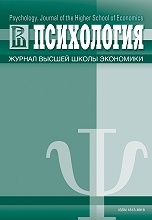Состоятельность как психологический конструкт: опыт психометрической валидизации
Аннотация
Целью данного исследования выступает психометрическая апробация показателей методики Психологической состоятельности личности (ПСЛ) В.А. Петровского, построенной на основе авторской метаимпликативной концепции личности с использованием формул булевой алгебры. Исследование было проведено на двух выборках: студентах 1 курса факультета психологии (N=88) и профессиональных девушек-моделей (N=57), близких по социально-демографическим характеристикам, но радикально различающимся по образу жизни и вытекающим из него требованиям к саморегуляции личности. Помимо методики Психологической состоятельности личности использовались также традиционные психометрические методики личностного потенциала: Шкала удовлетворенности жизнью Э. Динера, Общий опросник самоэффективности Р. Шварцера и др. Обработка результатов включала в себя сравнение шести показателей методики для двух разных типов задач, задаваемых инструкцией, а также для двух выборок; дисперсионный анализ влияния этих двух переменных на показатели ПСЛ и корреляционный анализ связей показателей методики ПСЛ с показателями двух дополнительных методик. Установлено, что в выборке моделей ни один из показателей ПСЛ не различается значимо для двух типов задач, в то время как в выборке студенток значимые (в большинстве случаев высокозначимые) различия обнаруживаются для всех показателей, кроме доступности задачи. Полученные нами данные позволяют говорить об эвристичности феноменологической модели состоятельности в целом.
Скачивания
Литература
2. Леонтьев, Д. А. (2006). Личностный потенциал как потенциал саморегуляции. В кн. Б.С.Братусь, Е. Е. Соколова (ред.), Ученые записки кафедры общей психологии МГУ им. М. В. Ломоносова (вып. 2, с. 85-105). М.: Смысл.
3. Леонтьев, Д. А. (2011). Саморегуляция как предмет изучения и как объяснительный принцип. В кн. В. И. Моросанова (ред.), Психология саморегуляции в XXI в.(с. 74-89). СПб./М.: Нестор-История.
4. Лефевр, В. А. (1996). Космический субъект. М.: Ин-кварто.
5. Лефевр, В. А. (2004). Алгебра совести. М.: Когито-центр.
6. Моросанова, В. И. (2012). Психология саморегуляции. М./СПб.: Нестор-История.
7. Осин, Е. Н., Леонтьев, Д. А. (2008). Апробация русскоязычных версий двух шкал экспресс-оценки субъективного благополучия. В кн. Материалы III Всероссийского социологического конгресса. М.: Институт социологии РАН/ Российское общество социологов, 2008.
8. Петровский, В. А. (2010). Человек над ситуацией. М.: Смысл.
9. Петровский, В. А. (2013). «Я» в персонологической перспективе. М.: Издательский дом Высшей школы экономики.
10. Шварцер, Р., Ерусалем, М., Ромек, В. (1996). Русская версия шкалы общей самоэффективности Р. Шварцера и М. Ерусалема. Иностранная психология, 7, 71-76.





